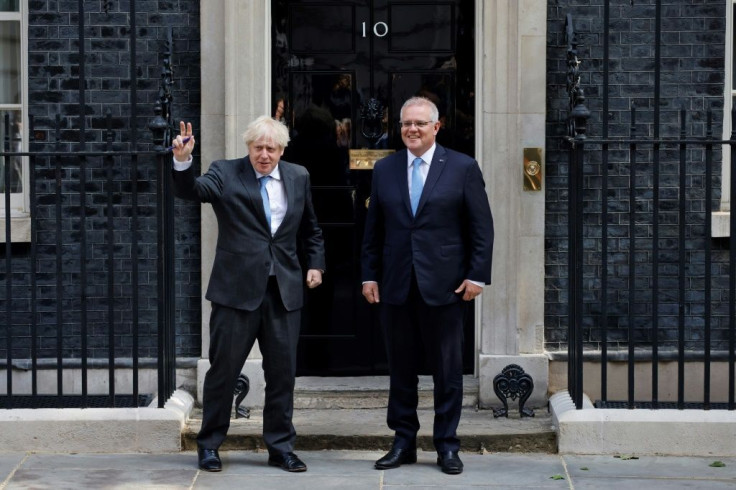UK, Australia Agree Post-Brexit Free Trade Deal
Britain on Tuesday unveiled a major free trade agreement with Australia as London pursues efforts to strike new deals since leaving the European Union.
It follows similar UK trade deals with Japan, and the European Union following London's divorce with Brussels.
Prime Minister Boris Johnson said the latest agreement "marks a new dawn in the UK's relationship with Australia, underpinned by... shared history and common values".
He added in a statement: "This is global Britain at its best -- looking outwards and striking deals that deepen our alliances and help ensure every part of the country builds back better from the pandemic."
Speaking later at a Downing Street press conference alongside Australian premier Scott Morrison, Johnson insisted that more trade agreements would follow.
"This is... a prelude to further deals," Johnson told reporters.
Morrison praised the "foundational partnership" that would strengthen economic links and boost cooperation between the two nations.
Foreign Secretary Dominic Raab tweeted that the deal was "an important stepping stone" in efforts to join a massive free trade zone in the Indo-Pacific region -- the Comprehensive and Progressive Agreement for Trans-Pacific Partnership.
The deal eliminates tariffs on UK exports, with a final agreement in principle to be published in the coming days, according to the government.
The UK-Australia trade relationship was worth ?13.9 billion (US$19.4 billion) last year and will grow under the deal, it added in a statement.
The two countries also plan to "intensify cooperation on security, climate change and science and tech", the UK government said.
The deal eliminates tariffs on imported Australian goods such as wine, swimwear and confectionery goods, it said.

Going the other way, British products including cars, Scotch whisky, biscuits and ceramics will be cheaper to sell into Australia.
It comes after the two nations addressed issues surrounding the farming sector.
British farmers will be protected by a cap on tariff-free imports for 15 years, using tariff-rate quotas and other safeguards.
"We are also supporting agricultural producers to increase their exports overseas, including to new markets in the Indo-Pacific," the UK said.
The deal with Australia -- a former British colony on the other side of the world -- is seen as low hanging fruit ahead of more difficult free trade talks with the United States and other major economic powers.
Britain earlier this month announced a free trade agreement with three European countries not in the EU -- major fishing neighbour Norway as well as Iceland and Liechtenstein.
Yet the UK finds itself caught in a dispute with major EU member France over post-Brexit trading arrangements in Northern Ireland.
Brussels is angered at London's refusal to implement checks on goods heading into Northern Ireland from England, Scotland and Wales.
The European Union is threatening retaliation if Britain unilaterally extends a grace period for trade in chilled meat, including sausages, next month.
The Northern Ireland Protocol, signed separately from the Brexit trade deal agreed in December, is supposed to see checks on goods heading into the province from mainland Britain.
The arrangement effectively keeps Northern Ireland in the European customs union and single market that the UK left in January, to stop unchecked goods going to the bloc via neighbouring EU state Ireland.
The British Chambers of Commerce, representing thousands of UK firms, described the Australia deal as a "positive step" but warned it would not offset EU wrangles.
"Trade with Australia represents only around 1.2 percent of the UK's total, so whilst a deal will have welcome benefits it will not offset the ongoing issues with trade to the European Union," said BCC trade policy head William Bain.
© Copyright AFP 2024. All rights reserved.





















